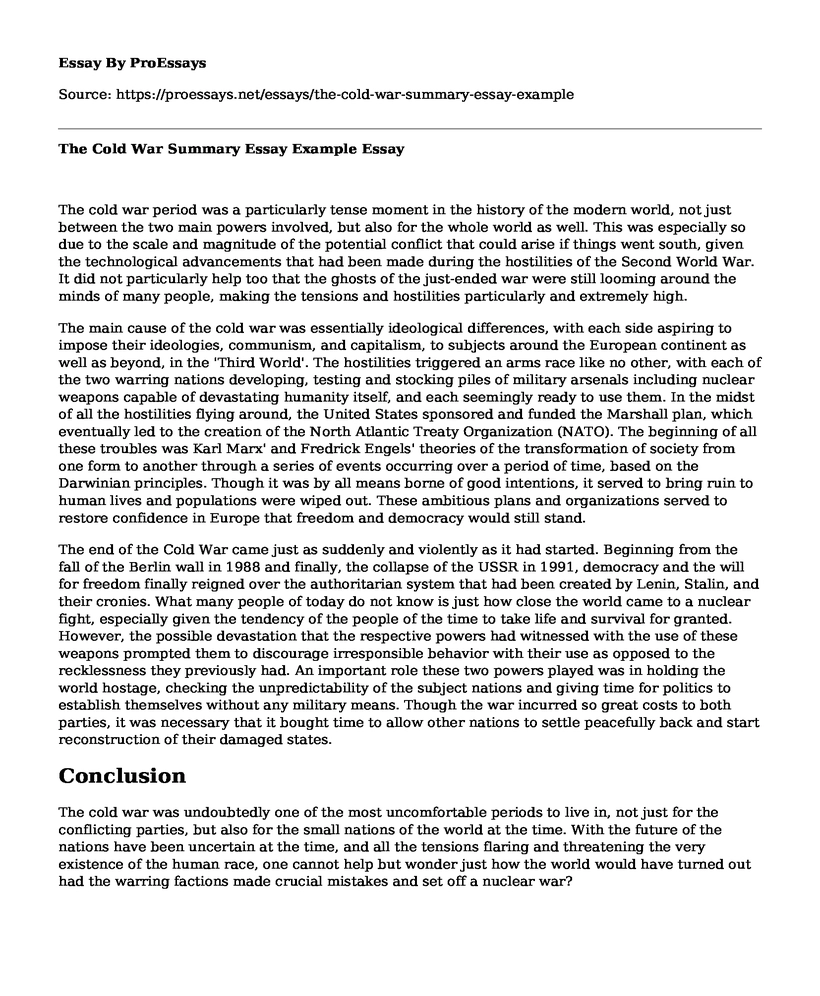The cold war period was a particularly tense moment in the history of the modern world, not just between the two main powers involved, but also for the whole world as well. This was especially so due to the scale and magnitude of the potential conflict that could arise if things went south, given the technological advancements that had been made during the hostilities of the Second World War. It did not particularly help too that the ghosts of the just-ended war were still looming around the minds of many people, making the tensions and hostilities particularly and extremely high.
The main cause of the cold war was essentially ideological differences, with each side aspiring to impose their ideologies, communism, and capitalism, to subjects around the European continent as well as beyond, in the 'Third World'. The hostilities triggered an arms race like no other, with each of the two warring nations developing, testing and stocking piles of military arsenals including nuclear weapons capable of devastating humanity itself, and each seemingly ready to use them. In the midst of all the hostilities flying around, the United States sponsored and funded the Marshall plan, which eventually led to the creation of the North Atlantic Treaty Organization (NATO). The beginning of all these troubles was Karl Marx' and Fredrick Engels' theories of the transformation of society from one form to another through a series of events occurring over a period of time, based on the Darwinian principles. Though it was by all means borne of good intentions, it served to bring ruin to human lives and populations were wiped out. These ambitious plans and organizations served to restore confidence in Europe that freedom and democracy would still stand.
The end of the Cold War came just as suddenly and violently as it had started. Beginning from the fall of the Berlin wall in 1988 and finally, the collapse of the USSR in 1991, democracy and the will for freedom finally reigned over the authoritarian system that had been created by Lenin, Stalin, and their cronies. What many people of today do not know is just how close the world came to a nuclear fight, especially given the tendency of the people of the time to take life and survival for granted. However, the possible devastation that the respective powers had witnessed with the use of these weapons prompted them to discourage irresponsible behavior with their use as opposed to the recklessness they previously had. An important role these two powers played was in holding the world hostage, checking the unpredictability of the subject nations and giving time for politics to establish themselves without any military means. Though the war incurred so great costs to both parties, it was necessary that it bought time to allow other nations to settle peacefully back and start reconstruction of their damaged states.
Conclusion
The cold war was undoubtedly one of the most uncomfortable periods to live in, not just for the conflicting parties, but also for the small nations of the world at the time. With the future of the nations have been uncertain at the time, and all the tensions flaring and threatening the very existence of the human race, one cannot help but wonder just how the world would have turned out had the warring factions made crucial mistakes and set off a nuclear war?
Cite this page
The Cold War Summary Essay Example. (2022, Oct 25). Retrieved from https://proessays.net/essays/the-cold-war-summary-essay-example
If you are the original author of this essay and no longer wish to have it published on the ProEssays website, please click below to request its removal:
- Thomas Jefferson's Relationship With the Red Indians Essay
- Essay Sample on Violation of Human Rights
- Paper Example on 1492: Europe Discovers the New World
- Essay Example on Plato: Father of Western Philosophy & Redefining Virtues
- Paper Example on Aus Mining Boom of the '60s-'70s: Impact on Real Per Cap Income & Commodity Prices
- Essay Sample on Ottoman/Persian/Egyptian Defensive Developmentalism
- Essay Sample on Carl Menger: Economist & Lawyer - 1840-1921







